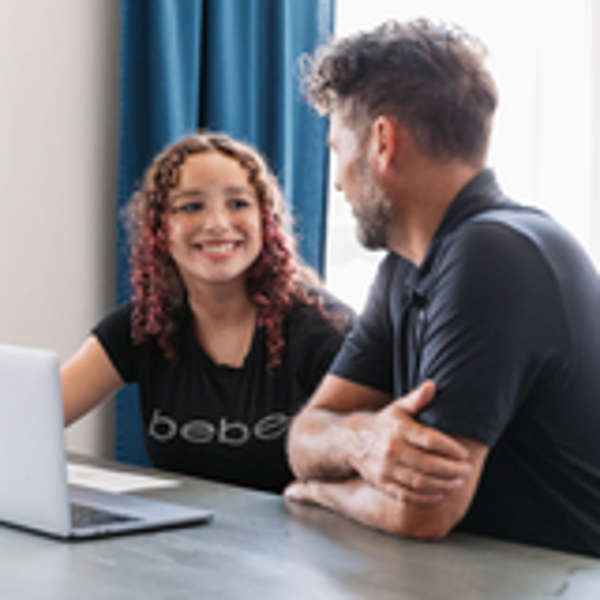Patience tops the list
4 Qualities teens look for in a foster parent
Carol Lee, Senior Editor

As a first-time foster parent for older children and teens, you may be wondering about the youth who will soon be placed in your home.
Who will they be? Will we have anything in common? Will they like it here? Will they like me?
Guess what? Teens in foster care are asking the same questions, with a lot more anxiety.
The experience of foster care for children and teens is often chaotic and frightening. So much is happening around them that they have no control over. “It’s scary,” said Reagan (16), “like you don’t know what’s going to happen next.” Lani (17) agreed. “I was scared because I was, like, ‘Who is this random lady?’”
In 2022, 38% of youth in foster care were between 10 and 18 years old, representing nearly 144,000 children. Licensing specialists routinely say the most pressing need is finding homes for youth in this age range. For older teens, reunification may not be an option before they age out to live independently, usually between ages 18 and 21. They especially need the guidance of a trusted adult as they envision and prepare for their future. (Data reflects the most recent information available from the annual AFCARS report.)
That’s why we asked Reagan and Lani to share a little about foster care from their points of view, particularly these four qualities they think are essential for foster parents of teens.
PATIENCE
The teen years are full of firsts as adolescents prepare for young adulthood. As they learn to become more independent, they will make mistakes—we all did. They need mentors to coach them through the rough patches and a safe place to land when they feel overwhelmed.
Being a teen is stressful enough when you’re secure in your home and family and can trust your caregivers will have your back no matter what. Kids in foster care are hyper-aware that one false move could get them removed from a placement and sent into more uncertainty. When they make mistakes, having a foster parent who responds patiently means everything.
LANI: I hit a trailer hitch with the car and was freaking out. My foster mom, Becca, was like, “It’s OK, just breathe. It’s a little dent. We’ll call that ‘the Lani dent.’” She was like, “We all make mistakes, and we learn from them.”
REAGAN: We have another foster sister who crashed the car. Becca was really patient about it, like she didn’t really show she was upset. I feel like if she’d reacted a different way, like if she’d gotten mad, that could have been triggering. I feel like she handled it really well.
RESPECT BOUNDARIES
Teens are notoriously private, and they will be especially guarded in a new place with new people where they don’t know the rules, spoken or unspoken. As a caring foster parent, you’ll naturally want to connect and help them feel comfortable in your home. Adults typically do that by asking questions and inviting conversation. While that likely feels friendly and intuitive to you, it may feel forward and intrusive to a teen—especially after experiencing broken trust with adults. Be ready to give it time to earn a teen’s confidence.
- REAGAN: Give us space at first because we’re in a new house and trying to get settled. I remember my first night here, I was eating dinner, and Becca asked if she could play the piano. I noticed she’d ask before she did something. That helped a lot. I would also say don’t ask questions about the past. If we want to talk about it, wait for us to come and talk to you.
ENTER THEIR WORLD
This may seem like conflicting advice after discussing the importance of respecting boundaries, but it’s a both/and situation. Respect that teens may not be ready or interested in sharing personal information with you. But they like knowing you genuinely care about them and their interests. Sometimes, you’ll need to ask them, and other times, you’ll quietly notice and remember their preferences and things they like to do. They’re going to feel like a stranger in your home for a while, so it will be up to you to consistently show yourself open and available, suggesting things you might do together.
LANI: When I first got here, Becca asked me a whole bunch of questions about myself, like, “What do you like to do?” and “Do you have a favorite TV show you’re watching?” We watched a show I like, and that made me feel comfortable.
REAGAN: Maybe play some games, like board games, or offer to watch a TV show together.
HELP THEM PLAN FOR THE FUTURE
For teens in foster care, there’s no single way they think or feel about the prospect of aging out and living on their own. For every youth who is counting down the days until they’re free from agencies and case workers and the system shaping their life, there’s another youth experiencing anxiety about the uncertainty of what comes next and how they’ll make it on their own. Either way, they can benefit from making plans for what their transition to independent living could look like.
- LANI: Thinking about the future is stressful! Once I turn 18 next year, I'll basically be living on my own. I mean, I’ll still be living here for a little bit until I get my own apartment. But I still have to find a car and save up a whole bunch of money to actually afford life, and I have to find somewhere to live and go to college. But I know Becca and my caseworker will try to help me as much as they can.
Thank you for your heart for teens in your community—you are so needed. Every teen in foster care deserves a safe, caring place to land in this uncertain time. If you can provide that safe haven in your home, you’ll make an important difference for teens who need you right now.
As you complete your licensing and training, you’ll likely hear a lot more advice about fostering teens—from your licensing specialist, from friends and family, and from anyone who learns you’re preparing to be a foster parent. Some will be helpful, and some will be less so, even if it is well-meaning.
Every teen experiences foster care in their own way, so remember what’s helpful advice for one teen may not be helpful for another. But there’s a reason we’re sharing these teen perspectives with you. No one knows more about Reagan and Lani’s foster care experience than they do. And having lived foster care, they offer a helpful perspective for anyone hoping to connect with teens.
Lani said it best: “We’re the ones going through it. This is our lives, and our voice matters.”



